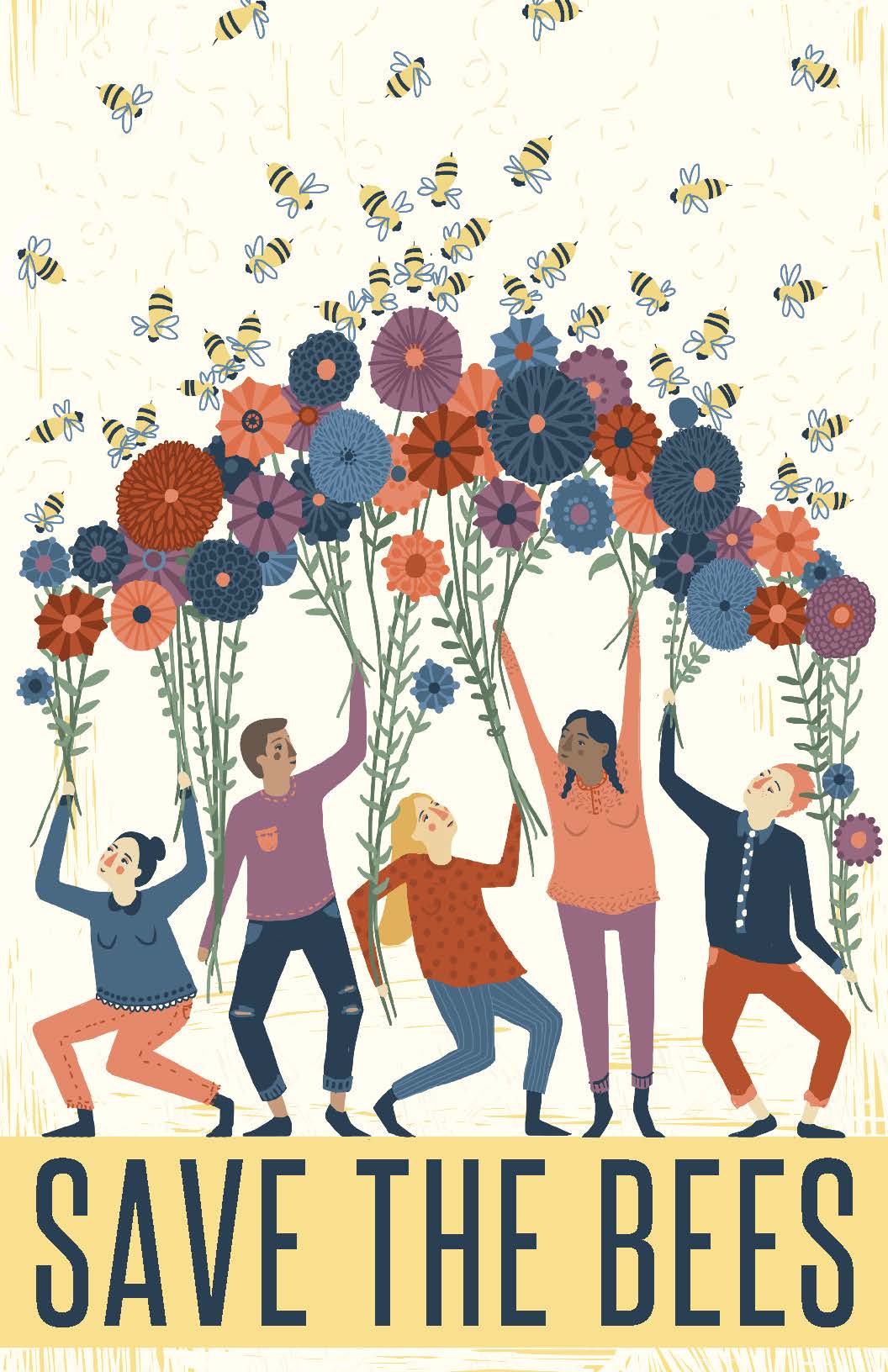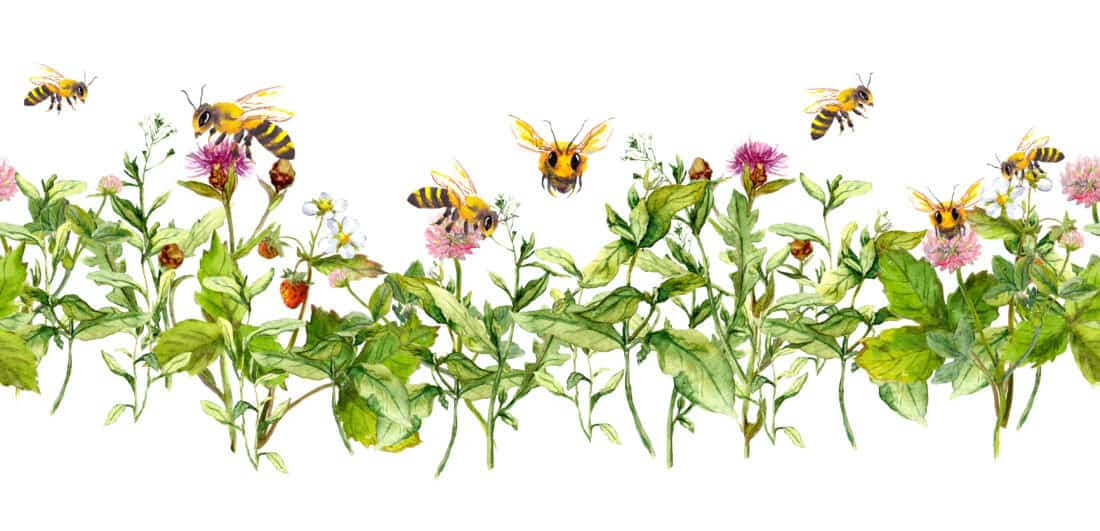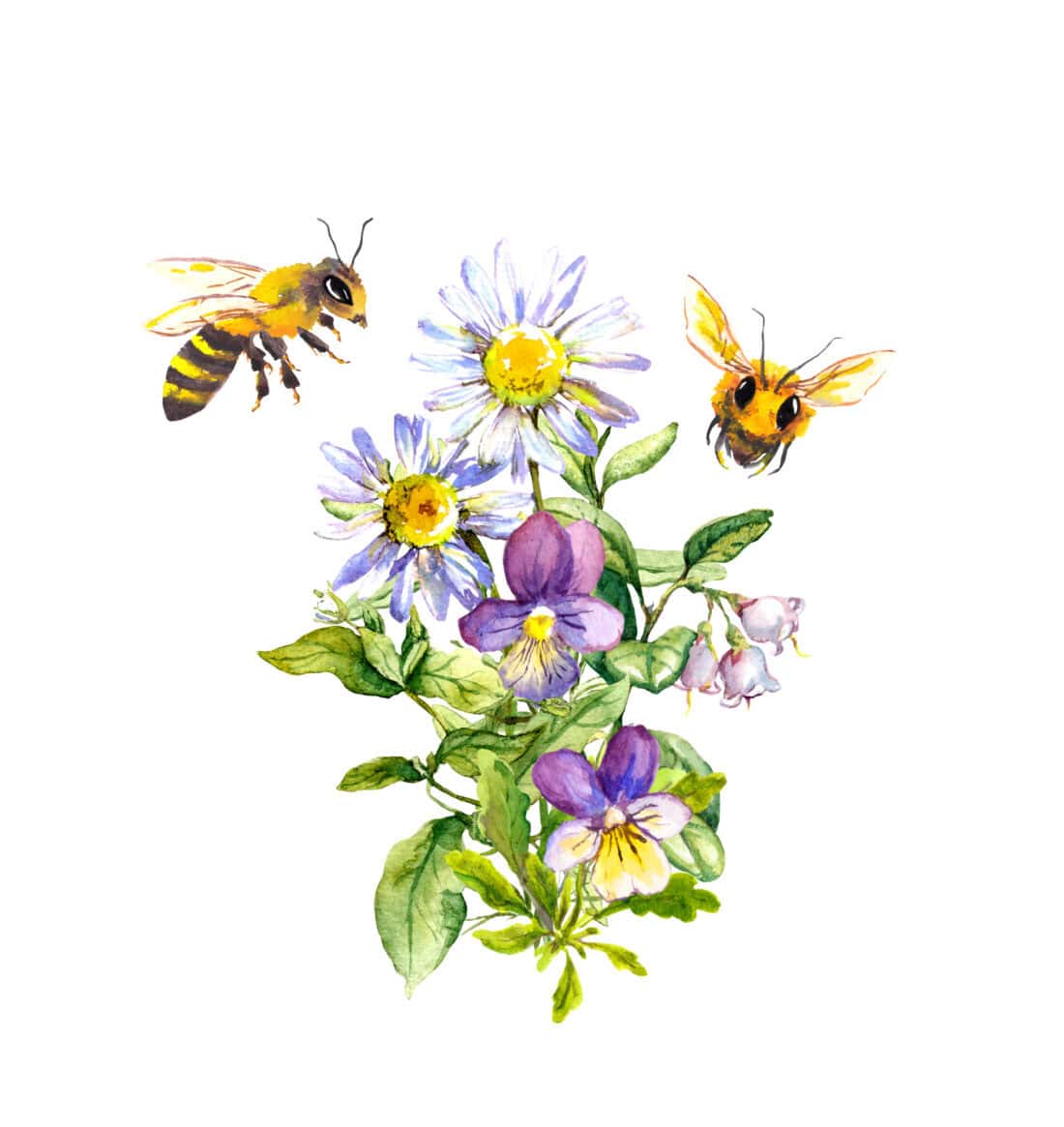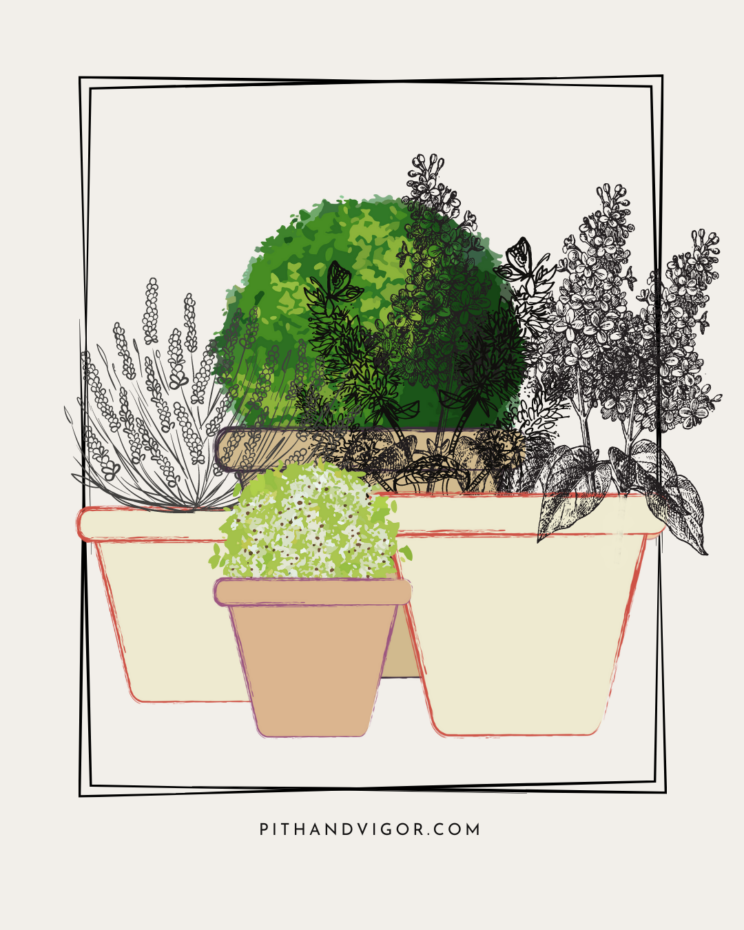“Bees?”
“Bees.”
“…BEES?”
“Yes, bees.”
“You seriously want to get bees?” asks Chris, standing in our kitchen staring at me as if I’d just declared that I wanted to start a blue whale farm in our bathtub. My tangible enthusiasm for the idea deflected off his “Mighty Force Field of Logic” and bounced around the room, further energizing me, yet having no impact on my husband, its intended target.

This should not have been a surprise to him. I’ve always been intrigued by bees. The social order they maintain and the work they are able to accomplish despite having brains the size of a sesame seed fascinated me. I wanted more.
“You recognize the liability involved in that. And how much does it cost to set this up versus the price of honey? One sec…I’ll be right back.”
I knew where he was going. He was going to get the “Whiteboard of Doom,” where calculations are made and where all my fun goes to die. You see, Chris is not just an engineer; he’s an engineer’s engineer. All math all the time. Near-retirement-age engineers who wear double-bridged glasses and keep index card folios in their pocket-protector-lined shirt pockets look at Chris and say, “Yeah—that’s my guy.”
When we were moving shortly after our wedding, he packed my wedding dress in a toilet box. A toilet box.
Why?
Apparently, because it was a good fit and made the box an optimal weight.
When I told him that was like my packing his beloved laptop in a tampon box, he informed me that was ridiculous because it would never fit.
The problem is, it’s hard to argue with logic (which is why, eight years later, my wedding dress still lives in a toilet box). But the excitement I had around keeping bees surpassed logic. What other hobby allows you to observe an entire society right in your back yard, seeing the benefits they provide i your flowers and vegetables and in those of your neighbors?
And as if that isn’t enough, you get fresh honey, beeswax, and perhaps best of all, a rockstar answer to the dreaded business meeting icebreaker: “Tell us your name, your title, and one interesting thing about yourself.” I keep bees. BOOM. Small talk for lunch officially in the bag.
I did what any rational wife would do – I ignored him and got bees anyway.
So I did what any rational wife would do—I ignored him and got the bees anyway.
Really, it was a highly serendipitous affair. The guys across the street were moving and happened to have an old beehive that they didn’t want anymore.
Score #1. Then it turned out that a lady around the corner kept bees, knew where to get them and offered to help me when I needed.
Score #2. A physician friend wrote me a prescription for an epi pen to have on hand just in case.
Score #3. You can’t fight destiny. Let the games begin.

I picked up my bees on Memorial Day weekend. About fifteen thousand little bugs in a screen box a little bigger than a shoebox. Before I could take the bees home, I had to demonstrate that I knew how to install them in their new hive, which was a total pop quiz.
Luckily, I had been obsessively studying books on bees and had essentially memorized the process. First, you paint the screens of the bee box with sugar water so the bees eat and get full and slow (think post-Thanksgiving dinner). After about a day, when they’ve had their fill, you suit up and prepare to open the box.
Side note here: For most people “suit up” means a full-body bee suit with boots and gloves and a hat. For me and my stubborn New England frugalness, “suit up” means a 15-year-old pair of ratty sweat pants tucked into pulled-up argyle ski socks, a pair of brown crocs, a sweatshirt with the sleeves tucked into bright green rubber dishwashing gloves and a thrift shop 1950s funeral-style hat with a face veil.
But back to the process, once the bees are fat and happy, you bring the box out next to the hive. Slowly, you pry the little lid off the box, revealing a suspended metal can containing sugar water that fed the bees during their voyage up from Georgia.
Also revealed is a little box containing the queen and a few attendants, just like Lady Mary Crawley in the coach to London attended by Mrs. Anna Bates and Mr. Thomas Barrow.
The key is to stay calm and even. Any fast, jerky, or sudden movement could upset the bees, and we all know what upset bees like to do. So here I am in my dishwashing gloves and Jackie O hat about to unleash thousands of bees into the space directly surrounding my face, and any freaking out will only make the situation worse. Fabulous.
Once I had the sugar can and the queen cage out, I removed the cork plug from one end of the queen box, took one of the frames out of the hive box, and rubber-banded the queen box to it. With the cork out, a little candy plug is all that stands between the queen and her populace, and all the bees work to chew that candy to free her. I put the frame back in (imagine the frames like hanging file folders and the hive box like a filing cabinet) and prepared for the next step. The scariest step … dumping fifteen thousand bees into the hive.
Before we get to that part, let’s backtrack a little. You may have the impression my husband was completely absent from the process since the moment I acquired the box of bees. This is not entirely accurate. Conveniently (for him), we had five friends in town for the weekend. Also, conveniently (for him), four of these friends are also engineers, and the other one is a lawyer. You can imagine the symphony of logic and liability that played out that morning. In the battle of whether this was a ridiculous idea or a wonderful idea, it was six against one, and I was clearly outnumbered. Until that is, I showed up with the bees.
When you paint the cage screen with syrup, all the little bees crowd to the front and use their mini bee tongues to lap up the sugar. Because of the width of the screen, they can’t actually sting through it. This means you can run your fingers along the screen and feel their legs and tongues sticking out through the holes. It feels tickly and is really very endearing. Suddenly, this mass of potentially pain-inducing insects becomes a pack of tiny, fuzzy, hungry, big-eyed munchkins that you kind of want to snuggle. I played the “what are you, a wuss?” card to get our visitors to touch the screen and within a few minutes they had come over to my side. Chris was the lone holdout.
As I prepared to dump the giant box of bees into the hive, I looked back at the house. Five eager faces were pushed up against the windows, smiling nervously and giving me the “thumbs up” on my progress so far. One other face was visible through the window, unimpressed but decidedly curious. I took a deep breath, picked up the buzzing box, and tipped it upside down on top of the open hive. About half the bees fell out just thanks to gravity, but the other half needed some coaxing. I had to shake the box—hard. The buzzing intensified and crescendoed and decrescendoed in waves as the box shook up and down. Bees flew everywhere, crawled all over my hands and legs, and buzzed up under my veil.
Since the cardinal rule of this step is not to freak out, I immediately freaked out.

The crawling on my body didn’t particularly scare me, but the buzzing in my face instigated the worst case of the heebie-jeebies I’ve ever experienced.
Flinging the box to the ground and shooting up from my crouched position, I let loose an awful high-pitched “eeeeeeeeeeeeeee!!!!” I then proceeded to high-step dance across the lawn like a Lipizzaner stallion in tucked-in sweats while shaking my limbs violently in a wholly ungraceful, possessed-by-the-devil manner. Once I reached the other side of the yard through this bizarre form of locomotion, I took a huge breath. I’d gotten almost all of the way through the process with no stings, and I only had to go back over, wait for the bees to descend down among the frames, and set up the temporary feeder.
To retain a modicum of dignity, I chose not to look back at the house, where, undoubtedly, my friends were still struggling for air after the laugh-fest my idiocy must have prompted. I put my shoulders back, straightened my dishwashing gloves, and strode back toward the hive.

Join The Collected Container Garden Course before Spring planting!
We have a FUN NEW Year of designing collected CONTAINER GARDENS ahead (Ditch the Thriller, Filler, Spiller chaos!)🪴.
Surprisingly, all the bees had climbed down into the hive and started working away on the frames. Before they could gather nectar or pollen to make honey, they had to make comb, which provides the cells in which the queen lays her eggs. Their underbellies were shiny with wax secretion, which they pulled off and started to build into hundreds of perfect hexagons. Hexagons are the optimal shape for bee comb, as they provide the most strength and the most cells per square inch, allowing the bees to get the most “bang for their buck” out of the precious wax they produce.
As the workers start building the comb, the queen is freed from her cage. Once she is freed, she goes on one mating flight, where she gets all the supplies she’ll need for a lifetime of laying eggs. She gets one mating session for her whole life, and the male bees die immediately after they essentially explode, thus making bee sex one of the greatest bummers in the animal kingdom. But I digress…
Then came the breakthroughs.
“Chris, Chris, Chris! Come here!” I jumped up and down next to the hive, waving him over like a little kid trying to get Dad to bring his wallet over to the ice cream truck. “You have to check this out!” A few weeks earlier, he would have declined my begging invitation, but he put on his “I’m not happy about this” face and trudged over: Exhibit A that he was starting to warm. “Look! Look at their little legs—see the bright orange and yellow blobs on them? That’s pollen—they collect it in little bags on their legs and bring it back to the hive. Isn’t that cool?” He leaned in (not too close, mind you) and squinted to see. “Ohhhhh yeah … neat.”
WHOA.
“Neat?!?!” Neat was about a six on Chris’ 1–10 scale of complimentary expressions. This was huge. If he thought the pollen collection was “neat” then what was next? Would it be possible to coax a “nice” or a “cool” out of him? I was willing to die trying.
“Hey, did you know that bees have a reserve stomach for the nectar they collect to bring back to the hive, but if they get hungry mid-flight they can actually open a little valve between that reserve stomach and their regular stomach, so they can use some of that nectar as food?” I knew I was playing with fire with the obvious barrage of fun facts, but I could sense he was coming around and I couldn’t control myself.
“No way. That’s nuts!” NUTS! Nuts was a 7! Progress! I decided to layoff. The disturbance from any further expressions of interest could ripple through the universe, inverting gravity and reversing electron charge, creating a massive black hole of joy where there was once a cranky engineer.
I lay in wait, like a patient lioness stalking her prey. A few days later, everything culminated in one glorious moment of reluctant acceptance.
“Hey, check it out,” Chris said, staring up at the sky just above the garage. “All the bees are flying in one line.” I saw my opportunity. “Yeah, that’s the bee highway. If you look, you’ll see a line of them going out and coming in. They have a few paths that they follow out of the hive, and they all stick to them.” He tilted his head contemplatively. “Wow. That’s really cool.”
My eyes widened, and I nearly levitated off my seat. “So, you like them?” I asked, sensing this was the grand moment.
“They’re not bad, I guess.” Then, with a sly smile, “but don’t push it. “
I’ll take that as a “win.”
by: AMANDA ROTONDO. illustrator: ABBEY LOSSING
This was originally published in Issue #1 of PITH + VIGOR in the Fall of 2014.







